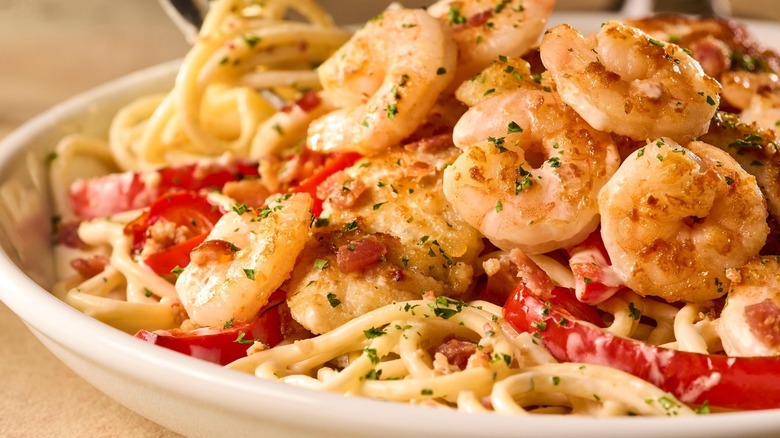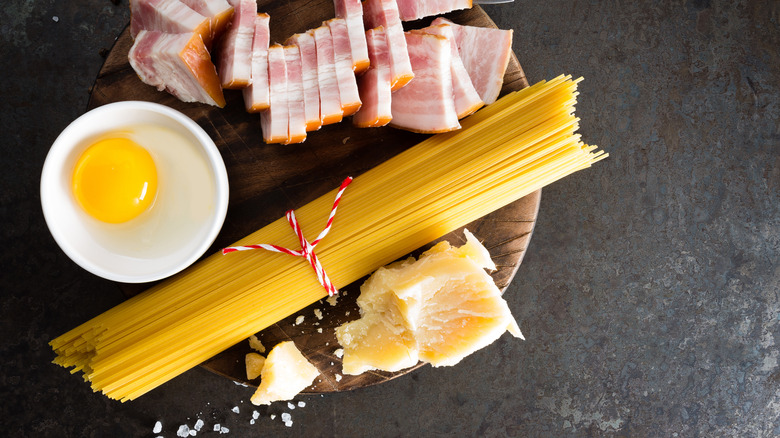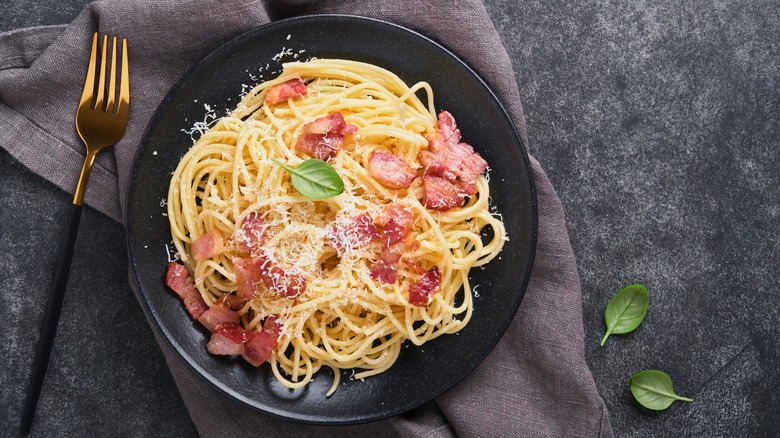The Traditional Ingredient Olive Garden's Carbonara Is Missing
While Olive Garden serves cuisine inspired by Italy, the restaurant chain isn't exactly built around faithfully recreating the European country's dishes. In particular, the pasta preparations don't always conform to old-world standards. For example, as a rule, Italians generally eat meat courses separately from pasta during their meals — meaning you'd be hard-pressed to find chicken parmigiana or even meatballs served alongside spaghetti. When it comes to carbonara (one of the four traditional pastas of Rome) there are distinctions between the real deal and what Olive Garden serves up, the most significant being the exclusion of eggs.
In an Italian carbonara, eggs are mixed into cooked pasta, creating a silky sauce that coats the dish in a velvety sheen. According to the Olive Garden's allergen guide, however, the chain's version of the storied dish is totally egg-free. In addition to the missing eggs, the Italian-American brand adds ingredients to make the sauce extra creamy and swaps in untraditional proteins.
Olive Garden removes eggs, but adds other ingredients
Although Olive Garden's pasta claims the carbonara name, the dish differs from the standard Italian fare in several key ways. When making traditional spaghetti pasta carbonara, there are few ingredients required beyond the noodles: mostly just black pepper, grated Parmigiano-Reggiano, cured pork, and beaten eggs. To make for easier incorporation, the egg and cheese get whisked in a separate bowl while the pasta boils and the pork sizzles away in a pan. Once the spaghetti or rigatoni reaches an al dente texture, the drained pasta is added to the pork, and then the cheesy egg mix is folded in to act as the dish's sauce.
Meanwhile, Olive Garden adds a number of extra ingredients to the sauce for its Chicken and Shrimp Carbonara. Although the official recipe that the restaurant uses doesn't seem to have been released, online copycats theorize that the chain uses parmesan cheese, butter, heavy cream, and milk to make the dish a little extra creamy. In traditional carbonara, the creaminess comes only from the eggs and cheese, with no milk or cream added to the sauce. A TikTok video from a self-proclaimed former Olive Garden employee shows how the sauce also gets a boost from roasted red peppers. Beyond these additions and the lack of eggs, Olive Garden's carbonara has another unique ingredient adjustment.
The protein deviates from the norm, too
A traditional carbonara calls for guanciale, a type of fatty preserved pork product made from the animal's cheeks. This Italian cured meat was banned in the United States until 2013, and pancetta became a more easily accessible alternative. At Olive Garden, however, neither of those are served. Instead, the pasta is served with a mix of shrimp, bacon, and chicken all in one dish.
The chain's take on carbonara isn't the only menu item that you wouldn't find in Italy. The arguably iconic soft, fluffy breadsticks might be delicious, but the Italian version is much thinner and crunchier. Back in 2011, the chain tried to invent "authentic" Italian dishes by using made-up Italian-sounding names. Needless to say, this was not well-received, and the menu items were ultimately phased out. While there's nothing wrong with enjoying a plate of carbonara from Olive Garden, you may want to look elsewhere if you're craving the genuine eggy artifact.


